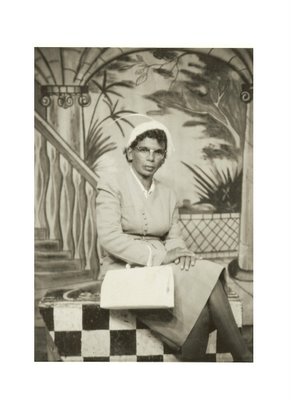 Katie Mae Best, left, was my grandmother and a tenant farmer in Mt. Olive, North Carolina. She taught me the real meaning of environmentalism by living it. During my summer visits I was exposed to farming and sustainable development practices. Although tobacco was the big cash crop and most activity centered around it, at varying times, I picked about everything that could be picked: cotton, huckleberries, cucumbers, watermelons, peppers, and strawberries. And that was the tenant stuff. Grandma, called 'Kate' by the locals, also had her own garden with peas, corn, beans, ocra, letttuce, cabbage, carrots, beets, tomatoes, onions, collard greens, and more. We would chop weeds in the garden with our hoes and she would apply just enough boric acid on some plants to control pests. Grandma also had a yard full of flowers and a walnut tree in the front yard. We would go fishing down at the nearby creek to catch all the perch we could eat. We played cards and shucked peas on the front porch and burned rags in a bucket to keep the mosquitos away. Her grandmother was a full blooded Cherokee Indian.
Katie Mae Best, left, was my grandmother and a tenant farmer in Mt. Olive, North Carolina. She taught me the real meaning of environmentalism by living it. During my summer visits I was exposed to farming and sustainable development practices. Although tobacco was the big cash crop and most activity centered around it, at varying times, I picked about everything that could be picked: cotton, huckleberries, cucumbers, watermelons, peppers, and strawberries. And that was the tenant stuff. Grandma, called 'Kate' by the locals, also had her own garden with peas, corn, beans, ocra, letttuce, cabbage, carrots, beets, tomatoes, onions, collard greens, and more. We would chop weeds in the garden with our hoes and she would apply just enough boric acid on some plants to control pests. Grandma also had a yard full of flowers and a walnut tree in the front yard. We would go fishing down at the nearby creek to catch all the perch we could eat. We played cards and shucked peas on the front porch and burned rags in a bucket to keep the mosquitos away. Her grandmother was a full blooded Cherokee Indian.A pump at the back of the house provided the best tasting groundwater in the world and the outhouse was not too far away. We weren't above walking the seven miles into town and a two mile round trip walk to the local store was a treat. I remember the excitement I alway felt when we left the paved road to get on the dirt road to my grandma's house. My brother and I would announce ouselves because grandma kept a small arsenal next to her bed and under her pillow. I did my first hunting there and skinned and ate the kills. Riding tractors, hanging tobacco in barns, and running around barefooted are all great memories. Watching hogs get shot in the head, their throats slit and hung upside down to bleed out provided a more realistic picture of how we get meat to eat. And the most interesting thrill was to see a chicken get its head wrung off by hand and watch it hop around for about 5 minutes. Our relatives probably got as much entertainment from our fascination (we were considered 'city slickers') as we got from watching the chicken hop around without its head. The process of learning how to boil the chicken to make it easier to get the feathers off was a true education. There were chicken coops for eggs and lye soap was made for washing. There were cows for milk and my grandmother would can enough beans, fruit, and provisions to make it through the winter. She also dried peppers and kept the hog meat in a freezer.
Yes my grandmother was a real environmentalist. It wasn't about policy or research or lobbying. It was about living off of the land and putting in a good long hard day of physical work. Happy Earth Day grandma. And thank you for the lessons in true environmentalism. Posted by AAEA President Norris McDonald.






No comments:
Post a Comment